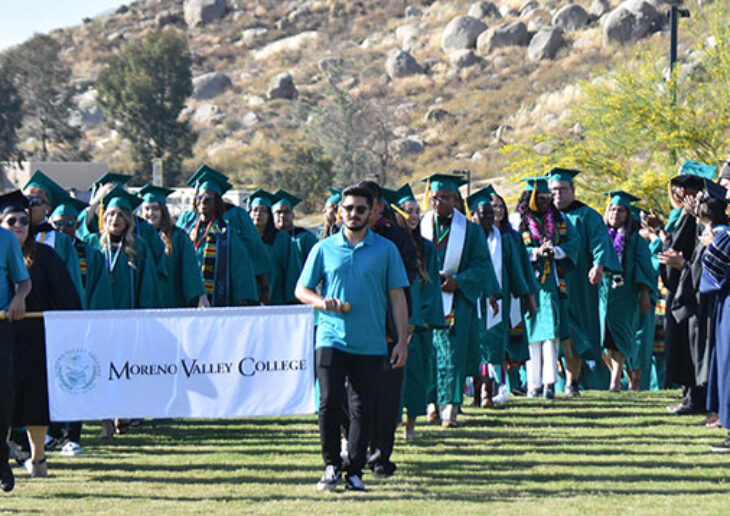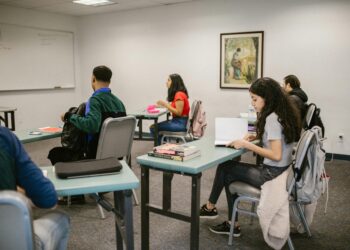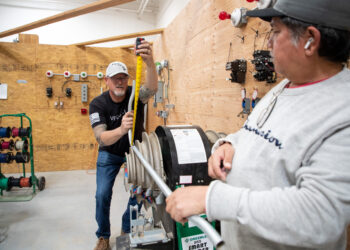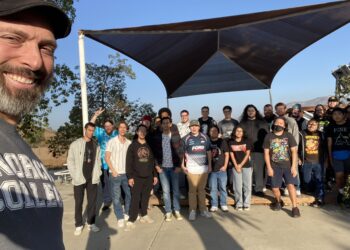College Receives Dr. John W. Rice Award Honorable Mention

Moreno Valley College received an honorable mention selection for the Dr. John W. Rice Student Success Award. Established in 2001, the Dr. John W. Rice Awards recognize community colleges leading the way in progressing student success, and diversity and equity. The California Community College Chancellor’s Office (CCCCO) evaluated statewide data in meeting the Vision for Success Goal, which included student success outcomes in percent increase in attaining degrees, certificates, and transfers while reducing the number of units.
After CCCCO’s evaluation of the statewide data, Moreno Valley College was selected as a finalist with one other college. The CCCCO noted there was a significant difference between the two finalists and the rest of the system. This highlights the increase in student success and outcomes at Moreno Valley College.
With this honorable mention, Moreno Valley College attributes its success by using a Theory of Change framework. The focus was to increase student success for all students, while closing equity gaps. With this framework, MVC was able to increase the number of students receiving degrees, receiving certificates, and transferring by 59 percent, 30 percent, and 16 percent, respectively. MVC attributes various actions in improving such outcomes; below are just a couple of those actions which have shown the biggest impact in our outcomes.
The six areas of focus for the College attributing to this accomplishment are:
- Communities of practice
- Removing barriers for awarding of degrees
- Hiring practices
- Equity focused
- Deep connections with K-12 districts and university partners
- Commitment to innovation
For instance, the English faculty developed communities of practice, collecting evidence on the relationship between professional development and student outcomes demonstrating higher success rates for faculty that participated in culturally responsive teaching practices. Four years after its inception, the department saw a 41 percent successful completion rate for first-time students in transfer-level English in their first year.
“I believe the English faculty has learned that a student’s GPA does not measure intellectual aptitude; it is measuring their challenges that span far beyond the classroom (i.e., money, childcare, etc.),” said Robin Steinback, Ph.D., president, Moreno Valley College. “The goal of these efforts is to move college practices, policies, processes, teaching, and services toward being a culturally responsive and sustaining institution. The College has supported pilot work within the English discipline focused on culturally responsive pedagogy, which is now being scaled to other disciplines like math. Through a research study, the pilot program demonstrated increased student course retention and success rates for those faculty, who received the training.”
Additionally, the College then set out to remove the barriers in rewarding degrees. During the 2017-18 academic year, the Riverside Community College District initiated support for its colleges to implement the auto awarding of degrees and certificates. MVC initiated the automatic awarding process and, as a result, the total number of awards (Associate Degree for Transfer, associate of arts and science degrees and certificates) increased 35 percent from 1,520 in 2016-17 to 2,318 in 2017-18. With this model, the College increased the number of students receiving a degree by 59 percent, a certificate by 30 percent, and saw students transfer by 16 percent. In each case, the Hispanic/Latinx population increased by the same rate or higher than the overall for degrees, certificates and transfers.
The College then addressed hiring practices. Studies have shown that student success is influenced by employing faculty and staff that resemble the student population. The College African American staff has increased over the past five years from 5.4 percent in the fall of 2015 to 8 percent in the fall of 2019. Additionally, 24 percent of faculty are Hispanic/Latinx as of fall 2019.
The College also sought to deepen its connections with K-12 district and university partners in order to further develop MVC into a comprehensive college by offering on-campus access/dual enrollment strategies in order to reduce the need for remediation, and effective transitional programs to bridge the gap from high school to college for first-time college students at MVC. To do this, College leadership launched a Partners Summit, bringing together faculty, staff and administrators from the College’s primary K-12 districts and transfer partners in order to share data, increase dialogue, and make change. Additionally, there are liaison faculty from the College that now meet regularly with the K-12 districts to collaborate on curriculum and expectations between high school and college classes.
“The collaboration has resulted in a number of outcomes,” Steinback said. “Discipline-based meetings and campus visitations; curricular re-design; reduction time in remediation through accelerated courses; and CTE course pathways have been outcomes of the Partners Summit.
“Through the collaboration, MVC and local K-12 districts worked together to develop a comprehensive college and career readiness model that focuses on access/dual enrollment, strategies to reduce the need for remediation, and effective transitional programs to bridge the gap from high school to college for first-time college students.”
The work of the College and local districts led to the recent pathway created through the College’s STEM outreach program to middle school students which includes the Cyberpatriot competitions and Cyber summer camps. 
A commitment to innovation is the cornerstone for MVC. In fall of 2019, the College opened the iMAKE Innovation Center. The 4,150-square-foot Center, located in the Science and Technology Building, serves as a hub for innovation and creativity, and lends itself to fostering enthusiasm for learning. The innovation center is eligible to join the MIT makerspace network and is designed to support courses from across the curriculum.
“The space is an area in which the College is focusing professional development efforts for faculty to learn active teaching and learning strategies like project-based learning and design thinking that can be implemented in their classrooms regardless of their discipline,” Steinback said. “Moreno Valley College is dedicated to supporting student success especially those in underserved populations. The College continues to work toward providing greater access to higher education while improving course completion rates, basic skill completion, degree and certificate completion, and transfer rates. It is only through these successful outcomes that we can eliminate equity gaps for all students.”
The annual Dr. John W. Rice Award winners were announced on September 30 via a livestream event, https://youtu.be/hnkY09YJGMs. Former US Secretary of State Condoleezza Rice, Ph.D., daughter of John and Clara Rice, and wife of John, were special guests. Pasadena City College won the Dr. John W. Rice Student Success Award.
Rice served on the Board of Governors from 1992 to 2000. A student advocate, Rice believed higher education was the greatest equalizer. This is the 20th year for the Dr. John W. Rice Awards. Colleges are judged on how they have supported improving student outcomes for students of color and improved the representation of faculty of color on campus over the last three years. For the past 19 years, California community staff members, faculty, districts, colleges or programs have been honored by the California Community Colleges Chancellor’s Office.




